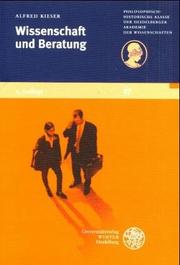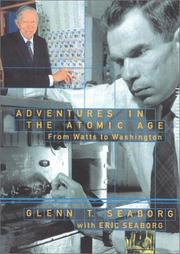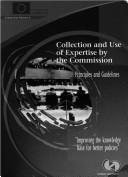| Listing 1 - 10 of 19 | << page >> |
Sort by
|
Book
Year: 2013 Publisher: Washington : U.S. Government Printing Office,
Abstract | Keywords | Export | Availability | Bookmark
 Loading...
Loading...Choose an application
- Reference Manager
- EndNote
- RefWorks (Direct export to RefWorks)
Environmental policy --- Science consultants --- Evaluation. --- United States.
Book
ISBN: 0815720971 Year: 1992 Publisher: Washington, D.C. : Brookings Institution,
Abstract | Keywords | Export | Availability | Bookmark
 Loading...
Loading...Choose an application
- Reference Manager
- EndNote
- RefWorks (Direct export to RefWorks)
America's governing system is unique in the extent to which scientists and other outside experts participate in the policy process. This wide-ranging study traces the rise of scientists in the policy process and shows how outside experts interrelate with politicians and administrators to produce a unique and dynamic policy process. It also shows how the very openness of American government creates the potential for unusual conflicts of interest. Bruce L. R. Smith focuses on the experiences of agency and presidential-level advisory systems over the past several decades. He chronicles the special complexities and challenges resulting from the Federal Advisory Committee Act-the "open meeting" law-to provide a better understanding of the role of advisory committees and offers valuable lessons to guide their future use. He looks at science advice in the Departments of Defense, State, and Energy; the National Aeronautics and Space Administration; the Environmental Protection Agency; and then examines how science advisory mechanisms have worked at the White House. Rather than simply providing a description of structures and institutions, Smith shows the advisory systems in action--how advisory systems work or fail to work in practice. He analyzes how the advisers influence the policymaking process and affect the life of the agencies they serve. Smith concludes with an assessment of the relationship between science advice and American democracy. He explains that the widespread use of outside advisers clearly reflects America's preference for pluralism. By scrutinizing agency plans, goals, and operations, advisers and advisory committees serve a variety of functions and attempt to strike a balance between openness and citizen access to government and the need for discipline and sophisticated expertise in policymaking. At the root of the advisory process is a paradox: scientists are called on because of their special expertise, but they are useful onl.
Science and state --- Science consultants --- Presidents --- Staff.
Book
Abstract | Keywords | Export | Availability | Bookmark
 Loading...
Loading...Choose an application
- Reference Manager
- EndNote
- RefWorks (Direct export to RefWorks)
Presidents --- Science and state --- Science consultants --- Staff --- History
Book
ISBN: 9781433837937 Year: 2022 Publisher: Washington, D. C. : American Psychological Association,
Abstract | Keywords | Export | Availability | Bookmark
 Loading...
Loading...Choose an application
- Reference Manager
- EndNote
- RefWorks (Direct export to RefWorks)
"This book presents a rich discussion of the opportunities organizational consultants have to impact the development of technical leaders, teams, and organizations. The expansion of the tech sector has revolutionized how processes are conducted in almost every realm of industry. The role of technical leaders has evolved from supporting organizational functions to creating and leading corporations, many with worldwide impact. This boom in the technology industry has brought along unique challenges and opportunities for organizational consultants"--
Science consultants. --- Technology consultants. --- Business consultants. --- Leadership. --- Organizational behavior.
Book
ISBN: 0309185874 1281300306 9786611300302 0309117127 Year: 2008 Publisher: Washington, D.C. : National Academies Press,
Abstract | Keywords | Export | Availability | Bookmark
 Loading...
Loading...Choose an application
- Reference Manager
- EndNote
- RefWorks (Direct export to RefWorks)
Science and state --- Technology and state --- Science consultants

ISBN: 3825313964 9783825313968 Year: 2002 Volume: 27 Publisher: Heidelberg : Winter,
Abstract | Keywords | Export | Availability | Bookmark
 Loading...
Loading...Choose an application
- Reference Manager
- EndNote
- RefWorks (Direct export to RefWorks)
Business consultants. --- Science consultants. --- Science consultants --- Business consultants --- Science advisors --- Consultants --- Efficiency engineers --- Management advisory services --- Management consultants --- Business analysts --- Interim executives
Book
ISBN: 9289458224 Year: 2004 Publisher: Luxembourg Office des publications
Abstract | Keywords | Export | Availability | Bookmark
 Loading...
Loading...Choose an application
- Reference Manager
- EndNote
- RefWorks (Direct export to RefWorks)
Science and state --- Science consultants --- Politique scientifique et technique --- Conseillers scientifiques

ISBN: 0374299919 Year: 2001 Publisher: New York (N.Y.) : Farrar, Straus and Giroux,
Abstract | Keywords | Export | Availability | Bookmark
 Loading...
Loading...Choose an application
- Reference Manager
- EndNote
- RefWorks (Direct export to RefWorks)
America's greatest twentieth-century scientist tells his own story. Glenn T. Seaborg (1912-1999) won a Nobel Prize before he was forty. He discovered the element that makes atomic bombs explode and the isotopes used to treat millions of cancer patients. He ran the University of California at Berkeley and advised nine U.S. presidents. Here is his autobiography -- the extraordinary story of a modest Swedish American who never strayed from his strong basic commitments throughout a career that gave him national and international fame. Seaborg's story begins in Michigan with his Scandinavian parents, but shifts quickly to California, where he got himself an education he didn't think he could afford during the dark days of the Depression. During World War II, he led the Manhattan Project group that devised the chemical extraction processes producing plutonium 239. He also shares the drama of scientific discovery and the inner history of his pioneering work on the many transuranium elements he co-discovered at the Radiation Laboratory at Berkeley -- work that earned him the Nobel Prize in 1951. As chairman of the Atomic Energy Commission under three presidents, Seaborg fought for the Nuclear Test-Ban Treaty and argued in favor of the peaceful uses and international controls of atomic energy. His is the riveting account of a life like no other -- a model of the best in our nation.
Chemists --- Nuclear energy --- Science and state --- Science consultants --- Government policy --- Seaborg, Glenn Theodore,

ISBN: 9289458216 Year: 2004 Publisher: Luxembourg : Office for Official Publications of the European Communities,
Abstract | Keywords | Export | Availability | Bookmark
 Loading...
Loading...Choose an application
- Reference Manager
- EndNote
- RefWorks (Direct export to RefWorks)
Science and state --- Science consultants --- Politique scientifique et technique --- Conseillers scientifiques
Book
Year: 2015 Publisher: [Washington, D.C.] : [U.S. Government Publishing Office],
Abstract | Keywords | Export | Availability | Bookmark
 Loading...
Loading...Choose an application
- Reference Manager
- EndNote
- RefWorks (Direct export to RefWorks)
Executive advisory bodies --- Science consultants --- Environmental law --- Law and legislation --- Legal status, laws, etc. --- United States.
| Listing 1 - 10 of 19 | << page >> |
Sort by
|

 Search
Search Feedback
Feedback About UniCat
About UniCat  Help
Help News
News